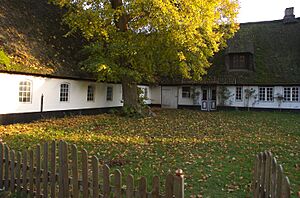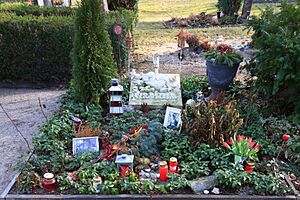Rio Reiser facts for kids
Quick facts for kids
Rio Reiser
|
|
|---|---|
 |
|
| Background information | |
| Birth name | Ralph Christian Möbius |
| Born | 9 January 1950 Berlin, Germany |
| Died | 20 August 1996 (aged 46) Fresenhagen, Germany |
| Genres | Folk rock, protopunk |
| Years active | 1970–1996 |
| Associated acts | Ton Steine Scherben |
Ralph Christian Möbius (born January 9, 1950 – died August 20, 1996) was a German musician. He was known as Rio Reiser. From 1970 to 1985, he was the lead singer and main songwriter for the rock band Ton Steine Scherben. After the band broke up, he started a solo career.
Some of his most famous songs with Ton Steine Scherben include Macht kaputt, was euch kaputt macht, Keine Macht für Niemand, and the Rauch-Haus-Song. As a solo artist, his well-known songs are König von Deutschland, Alles Lüge, and Junimond. Rio Reiser supported social movements and political parties throughout his life.
Contents
Who Was Rio Reiser?
Early Life and Family
Rio Reiser, whose real name was Ralph Christian Möbius, was born in Berlin, Germany. His father worked as an engineer for Siemens. Because of his father's job, his family moved many times. They lived in different cities like West Berlin, Nuremberg, and Mannheim. Rio often felt like he didn't have a true home.
Friends later said that he started playing music to create a place where he felt he belonged. He had a very independent spirit. For example, he convinced his mother to let him leave school. He then tried an apprenticeship in photography, but he quit that too.
Discovering Music and Talents
Rio then joined a music conservatory. At just 17, he moved to West Berlin to work on the world's first "Rock Opera." His mother supported his artistic dreams. She saw that he was a autodidact, meaning he taught himself things. He learned to play the cello, guitar, and piano on his own. He also wrote songs and poetry. Later, he even acted in movies, TV shows, and plays.
He got the nickname Rio when he was a teenager. An artist friend of his family gave him the name "Rio de Galaxis." He kept this nickname. Later, he officially changed his name to Rio Reiser for a movie role. He got the idea for "Reiser" from his older brother. The name also connects to a character in an old German novel.
Musical Influences
As a teenager, Rio Reiser became a huge fan of The Beatles. He was 13 years old and saw them as the sound of the future. They inspired him to learn guitar and write his own songs. He also formed his first band. Later, he liked the rougher sound of The Rolling Stones.
Rio and his close friend R.P.S. Lanrue wrote most of the songs for Ton Steine Scherben. They were often credited as "Möbius/Steitz." Besides rock bands, Rio was also influenced by orchestral film music and traditional German songs. He also admired German singers like Marlene Dietrich.
Finding His Voice
Rio Reiser was unique among German rock stars of his time. He was open about his personal life from 1970 onwards. He sometimes felt different from political groups in the early 1970s. But he gained confidence working with artists in Berlin's new social movements.
As an adult, Rio found that music helped him express himself. It helped him overcome shyness. He could connect with people, even large concert audiences, through his music. Many said this was his special talent.
Rio Reiser's Musical Journey
Starting with Bands
While still in school, Rio became the singer for his first rock band, The Beat Kings. The band was started by R.P.S. Lanrue, a neighbor. Lanrue had heard Rio sing and asked him to join. Lanrue soon became Rio's closest friend and musical partner. He supported Rio as a musician and lived with him for most of his life.
After school, Rio moved to Berlin to compose music for his brothers' "Beat-Opera." He called it an "absolute flop." But Rio stayed in Berlin, and Lanrue later joined him there.
Rio also worked with a theater group. They performed scenes about the daily lives of young people in West Berlin. This helped Rio understand social problems and the desire for change. This involvement shaped his political views. It led to his lifelong support for various movements. These included workers' rights and later, the German environmental movement. His music often reflected these strong beliefs.
Ton Steine Scherben: A Band with a Message
In 1970, Rio Reiser recorded his first song with the band Ton Steine Scherben. The band's name was chosen by the members and friends. It can mean "clay stones shards" or "sound stones shards." This gave it different meanings, sometimes seen as a political statement. It also hinted at Rio's favorite band, The Rolling Stones. That same year, the band played their first public concert and released their first album.
The band quickly became popular with people involved in social movements. They played at many political events, demonstrations, and rallies across Germany. Their music often inspired people to take action. After concerts, buildings were sometimes taken over by activists. The band often ended up discussing politics with their hosts.
For 15 years, the band toured, released more albums, and worked on film projects. They also made two children's records. Rio lived with the band and many friends, first in a shared house in Berlin. In 1975, the group moved to a farm in Fresenhagen, in North Germany. This farm became Rio's peaceful retreat. One of their most important albums, the "Black Album," was recorded there.
Ton Steine Scherben was very successful musically. They were one of the first German rock bands to write and perform songs in German. They opened the door for many other German rock and pop bands. However, they didn't want to fit into the mainstream music business. They also had money problems. This meant they couldn't turn their popularity into financial stability.
Rio Reiser's Solo Career
In 1985, Rio Reiser and Ton Steine Scherben broke up. This was partly because they felt it was time for something new. But a big reason was their bad financial situation. Rio had a large debt from the band. But his solo career started so well that he paid off his debts quickly.
His first solo album was called "Rio I." It included the famous song König von Deutschland ("King of Germany"). This song became one of Rio's biggest hits. Many artists have covered it, and most people in Germany still know it. Other popular songs from the album were "Für immer und dich" and "Junimond."
Rio didn't have the same huge commercial success with his later albums. However, he released five more studio albums before he passed away. Critics often praised these albums. Some fans from his Ton Steine Scherben days thought he was "selling out" by becoming a commercially successful musician. But if you listened closely to his lyrics, Rio never gave up his personal views on music, politics, and life. He just shared his messages in a more subtle way.
Rio sometimes said that the criticism from old fans was hard for him. He struggled to balance being commercially successful with staying true to his old friends and political beliefs. This struggle sometimes made him feel sad. But he kept creating music and touring a lot.
A highlight of his career was two concerts in East Berlin in 1988. He played to a sold-out hall filled with young people. This was just before the fall of the Berlin Wall. Recordings show that the East German audience knew all his solo songs and Ton Steine Scherben songs by heart. This was amazing because his albums were hard to find in East Germany.
Rio wrote and performed most of his songs himself. His friend R.P.S. Lanrue often played lead guitar and helped with musical ideas. Rio's last solo album, Himmel und Hölle (Heaven and Hell), was recorded in 1995. After this album, Rio was planning to make new music independently. But his sudden death stopped him.
Some critics said Rio Reiser created a new kind of German folk singer. He was even called a "Volksmusik" musician, which means "music of the people." Rio sometimes liked this term because he believed he sang music for the people.
Rio Reiser's Passing
Rio Reiser passed away on August 20, 1996. He died from a sudden health problem at his home in Fresenhagen. He was first buried on his own property under an apple tree.
In March 2011, his grave was moved to Berlin. This happened because Rio's family sold the Fresenhagen property.
Albums by Rio Reiser
Rio Reiser released six studio albums as a solo artist.
Studio Albums
- 1986: Rio I.
- 1987: Blinder Passagier
- 1990: ***
- 1991: Durch die Wand
- 1993: Über Alles
- 1995: Himmel und Hölle
Live Albums
- 1999: Live in der Seelenbinder-Halle, Berlin/ DDR 1988
Other Albums
- 1974: Martha – Die letzte Wandertaube (music for a film)
- 1998: Am Piano 1
- 1999: Am Piano 2
Singles
- 1984: Dr. Sommer
- 1986: Alles Lüge
- 1986: Junimond
- 1986: König von Deutschland
- 1986: Für immer und dich
- 1987: Blinder Passagier
- 1990: Geld
- 1991: Jetzt schlägt’s 13
- 1993: Nimmst du mich mit
- 1995: Straße
Images for kids
See also
 In Spanish: Rio Reiser para niños
In Spanish: Rio Reiser para niños
 | John T. Biggers |
 | Thomas Blackshear |
 | Mark Bradford |
 | Beverly Buchanan |





